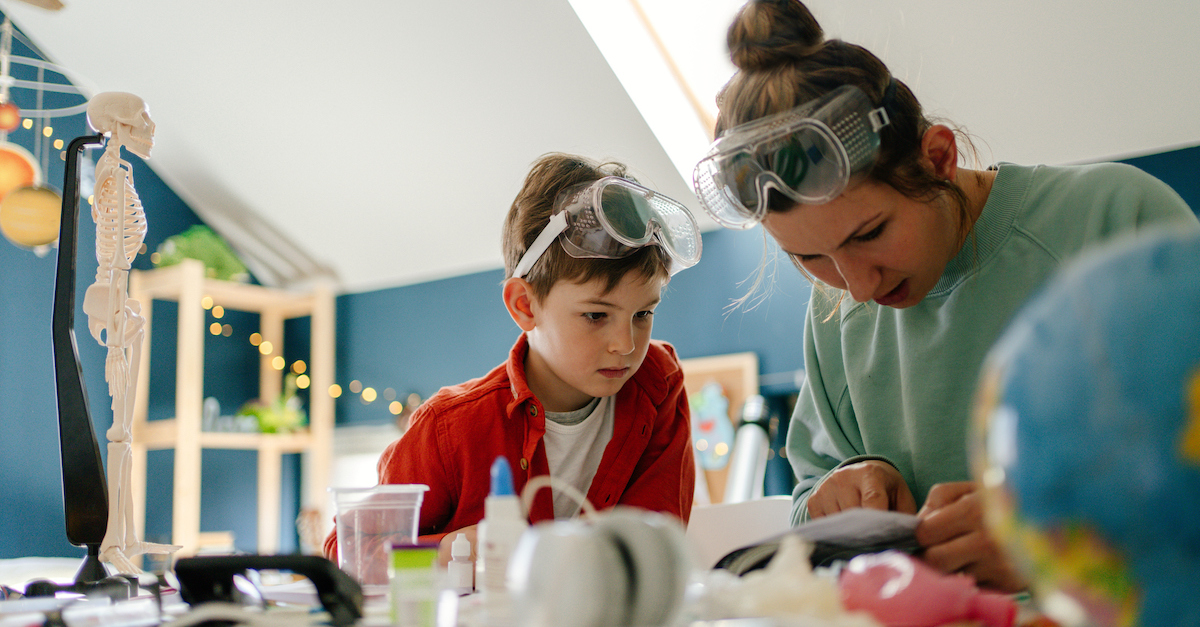Our oldest children went to a public charter school from kindergarten through half of seventh grade, giving us insight and experience in the public school system. Once we decided to bring them home, our homeschool journey continued for the next 14 years until our youngest graduated high school. I guess you could say we've experienced the best (and worst) of both worlds while learning a few important things along the way.
Here is an informative comparison between Christian homeschooling vs. public schooling, as well as a few advantages and disadvantages. If you're trying to decide what is best for your family, I hope this post removes some guesswork and helps you make an informed decision.
Christian Homeschool Curriculum
Advantages:
One of the main advantages of a Christian homeschool curriculum is that it allows parents to incorporate biblical principles into their child's education. Most subjects are taught from a biblical worldview, which equips kids to answer life's greatest questions through the teachings of the Bible. This provides a strong foundation for a child's spiritual development, which, in some cases, is more important than academic development.
Another advantage of using a Christian homeschool curriculum is the flexibility it offers. Parents can tailor their child's learning environment to their specific strengths and interests. They get to choose the pace at which their child learns, ensuring they fully understand a concept before moving on.
Finally, a Christian curriculum prevents controversial material from being part of the child's education. Parents can ensure that their child is not exposed to harmful or inappropriate content that may be present in the public school system. Topics such as sex education and personal identity are left to parental discretion and are taught from the perspective of God's design.

Disadvantages:
Because Christian homeschool curricula put a strong emphasis on biblical values, it can sometimes lead to a judgmental attitude surrounding those with a secular worldview. While I firmly believe in the truth of God's Word, I also believe in showing Jesus' love to a lost and dying world. Parents should stand on the truths of the Bible while also emphasizing a heart of love, compassion, and empathy.
Christian curriculum has also been known to be a bit lacking in certain subjects such as science and history, potentially leading to limited understanding in these areas. Careful decisions should be made regarding state-required subjects in order to comply with graduation requirements.
Solely relying on a Christian homeschool curriculum might not adequately prepare students for higher education. Consequently, students may find it challenging to transition into college or other academic pursuits, possibly inhibiting higher levels of study.
For more detailed information, here's a post titled Homeschool Curriculum Reviews.
Public School Curriculum
Advantages:
One advantage many parents and teachers appreciate about the public school curriculum is its standardization. Because public schools across the country typically follow a set curriculum, it is unified across most states. This ensures that all students, regardless of their location or school district, will receive a similar education. It also allows for easy transfer of students between schools in hopes that they can seamlessly continue their education without major gaps in grade levels or learning abilities.
Another advantage of the public school curriculum is its inclusivity. Public schools are required to provide education to all students, including those with disabilities or special needs. The curriculum is designed to accommodate diverse learners and provide appropriate support and resources. The aim of this is to ensure every student has an equal opportunity to learn and succeed.
Lastly, public school curriculum often focuses on providing a well-rounded education and typically includes an additional range of subjects beyond the basics. From the public school perspective, this interdisciplinary approach helps students develop critical thinking, problem-solving, and communication skills that they believe are essential for success in the real world.

Disadvantages:
A significant disadvantage of the public school curriculum is its lack of flexibility and individualization. Public schools follow a uniform curriculum that is designed to meet the needs of a large group of students. However, each child has their own unique learning style, interests, and strengths. The one-size-fits-all approach fails to cater to individual needs, resulting in students who may feel unmotivated, unchallenged, or left behind.
Another disadvantage of public school curriculum is its heavy focus on standardized testing. Sometimes, schools prioritize preparation for standardized tests over key educational components. Teachers often feel pressured to ensure high test scores, which takes time away from nurturing a child's creativity and love of learning.
A big complaint about public school curriculum is that it has veered so far away from fundamental skills that kids are struggling to read, write, and do basic arithmetic. Modern methods have taken the foundational elements of math and phonics and created confusing, non-efficient ways of teaching these much-needed skills. Many parents are at a loss when trying to help their children with homework - even in elementary school.
Here's an interesting article titled How Phonics Is Making a Comeback as Millions of Kids Struggle to Read.
Christian Homeschool Character Development
Advantages:
Character development is at the top of the list for most Christian homeschool families. In fact, it's often just as important as academic success for parents striving to raise Godly children. As part of the child's daily lessons, homeschool parents teach Biblical values and aim to demonstrate them throughout the week. This provides the opportunity to instill a strong foundation of faith from a young age and hopefully lead their children to Christ. The constant exposure to biblical principles nurtures integrity, morality, and God-given reasoning skills, which provide a moral compass as the child matures.
Another advantage of character development for the Christian homeschooler is the personalized attention and guidance they can offer. Without the rigorous schedule of the public school system, parents have the time to invest in building their children's character in real-time. When issues arise, homeschooling allows room to nurture the child through the problem without trying to work around a strict school schedule.
This personalized approach also facilitates a deeper understanding of Christian principles, as children are able to engage in discussions and activities that support Godly character. Both parents and children have ample opportunities to integrate Godly attributes into real-life situations. The constant interaction and involvement of parents in their child's character development creates a supportive environment that promotes maturity in life and faith.

Disadvantages:
One disadvantage of Christian homeschool character development is the potential for children to adopt their parent's negative behaviors. I learned this the hard way as my kids picked up on some of my bad habits, including an occasional cuss word murmured under my breath. (Not proud of this!)
Because homeschooled families spend SO much time together, it's easy for tempers to flare and arguments to arise. This can become an unhealthy pattern in dealing with daily conflict, and it's important to set boundaries from the start.
Furthermore, character development in a Christian homeschool environment may also lead to a severely narrow perspective. While the Bible provides a solid foundation for understanding right and wrong, according to God's standards, some Christian homeschool families might become overly critical of others and nurture cynicism instead of a joy-filled life. By solely focusing on a singular perspective, children may miss out on the opportunity to discuss ethical issues openly, which may lead to secrecy or a tendency towards dishonesty.
Public School Character Development
Advantages:
Public schools can play a vital role in character development by providing student interaction with kids of various ethnicities and backgrounds. This exposure might help children develop empathy, understanding, and appreciation for others. Because public schools often have a mix of students from different cultures, socioeconomic statuses, and abilities, children can learn to appreciate different family environments.
Another advantage of public school character development is the emphasis on teamwork and collaboration. Public schools often promote group projects, team sports, and extracurricular activities that require students to work together towards a common goal. Through these experiences, students learn the importance of cooperation and communication. This can help kids develop skills to benefit them in future pursuits and careers.
Disadvantages:
One disadvantage of public school character development is the lack of personalized attention. There are simply too many students per classroom; therefore, teachers and school staff are incapable of offering individual character training based on each student's needs. As a result, some students may not feel personally connected or engaged, thus hindering their ability to actively participate and develop healthy character traits that foster a love for learning and relating with others.
The greatest disadvantage to public school character development may include toxic ideas and cultural practices that have nothing to do with education. One complaint is that too much time is spent on the social/emotional development of children rather than on strong morals and academics. The infiltration of misguided sexual identity and immorality has also permeated most public schools, which is of great concern to Christian families.
Here's more on the social/emotional aspect from Family Research Council.
Christian Homeschool Opportunities
Advantages:
A prominent benefit of Christian homeschooling is the opportunity for families to join others in the homeschool community and build lasting bonds and friendships. This might be in the form of Christian co-ops where parents take turns teaching classes or extracurricular activities such as bowling, theater productions, or art classes. The best part is homeschoolers aren't limited to after-school hours and can enjoy these activities any time of the day.
Volunteer opportunities are also at the forefront for many Christian homeschool families. Whether it be the local soup kitchen, food pantry, or homeless shelter, homeschooling provides more margin in the schedule to prioritize volunteering.
Disadvantages:
While most school districts allow homeschoolers to join sports, clubs, and extracurricular activities, it's not always easy access. Christian homeschool students can feel left out and even excluded from clubs and sports teams, and it can be difficult for them to integrate since they aren't part of the classroom camaraderie. It's not impossible to engage homeschooled children in public school opportunities, but there might be some challenges involved.
Public School Opportunities

Advantages:
Public schools provide unique opportunities for children to explore a variety of activities, including music, theater, sports, and art. Not only are these classes incorporated into the school day, but they are also extended into extracurricular activities that engage kids on evenings and weekends. By participating in these activities, kids gain a sense of confidence, teamwork, and peer-to-peer interaction.
There are also specialized programs, including special education and support services, that are government-funded and ensure no child is left out. This assists parents who need help integrating their special needs child into the education system. On a personal note, my daughters-in-law are both trained in special education and have many heartwarming stories of the opportunities given to children with special needs in the public education system.
Disadvantages:
Probably the most significant disadvantage of public school opportunities is the increase in class size, which severely limits teachers' capabilities and causes students to fall through the cracks. This is a growing problem that has led to many resignations and staffing issues, and honestly, many schools are in crisis mode because of it.
Due to budget cuts, many schools have been forced to pare back on creative classes such as music, art, and physical education, limiting children's holistic development. For kids who have a particular passion or talent in these areas, this can be detrimental to their love for learning and educational engagement.
The thing for Christian parents to keep in mind is that there are benefits to both homeschooling and public school. As long as you maintain your rights to raise your children as you see fit and are fully engaged in their educational and character development, whatever you choose can be a successful option. Pray hard and ask God for wisdom, knowing He will give it. He has a plan for your child's education, and it is the best plan moving forward.
Related:
The Benefits of Christian Homeschooling
4 Ways I Know Homeschool Was the Right Choice for My Family
 Jennifer Waddle is the author of several books, including Prayer WORRIER: Turning Every Worry into Powerful Prayer, and is a regular contributor for LifeWay, Crosswalk, Abide, and Christians Care International. Jennifer’s online ministry is EncouragementMama.com where you can find her books and sign up for her weekly post, Discouragement Doesn’t Win. She resides with her family near the foothills of the Rocky Mountains—her favorite place on earth.
Jennifer Waddle is the author of several books, including Prayer WORRIER: Turning Every Worry into Powerful Prayer, and is a regular contributor for LifeWay, Crosswalk, Abide, and Christians Care International. Jennifer’s online ministry is EncouragementMama.com where you can find her books and sign up for her weekly post, Discouragement Doesn’t Win. She resides with her family near the foothills of the Rocky Mountains—her favorite place on earth.